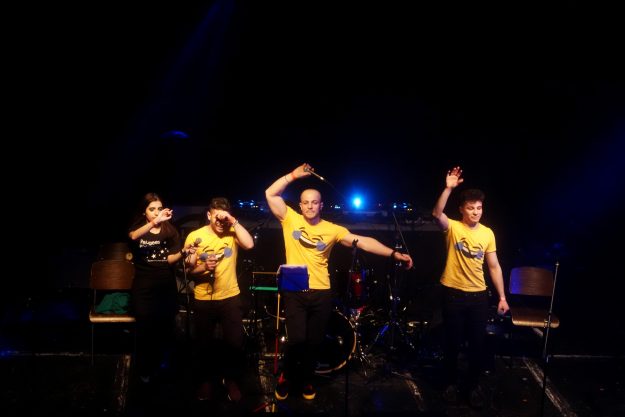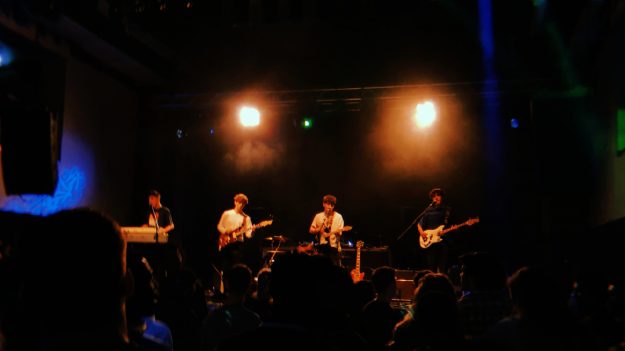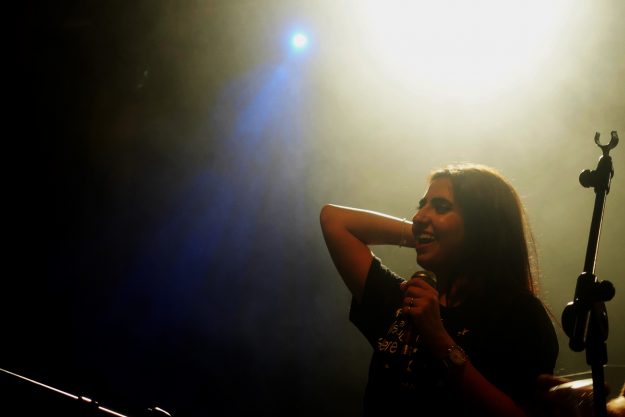”Music really is a universal language.”: how does music help refugees in Cardiff?

The man standing on the left of the stage with his formal clothes looks completely different from the three guys wearing yellow t-shirts with a logo on them. He takes the microphone and starts singing a traditional, slow, Arabic song with the crowd applauding. Some of them understand the lyrics, some of them not, but it doesn’t matter. They all somehow feel touched.
The man on the left looks not only passionate about the lyrics he is singing but also looks proud, happy, and moved. He is the father of the three men with the yellow t-shirts, accompanying their performance and representing the culture and the music of their home country, Syria.
”We are not doing this for money. Music is happiness, it is a way of escaping every day’s stress from work and we enjoy watching people having fun even if they don’t understand the lyrics,” says Issa Alsaher one of the three members of the Alsaher brothers who set the stage on fire along with their father.
The Refugee Rhythms 2019 party took place last Thursday on 21 February, at Cardiff University’s Students’ Union, for the purpose of raising money to improve refugees’ and asylum seekers’ life in Cardiff.
The Student Action for Refugees (STAR), with the support of Amnesty students and Politics Society students, organized a multilingual and multicultural event with a lot of food, music, and dancing, with the ticket’s price addressed to the refugees and asylum seekers in need.
Molly Wingate, who has been volunteering at STAR for three years, says, “Music really is a universal language and can allow people who previously knew each other only through the prism of conflict or dissimilarity to come together in the name of art.”
Sadiyah Ahmed, president of Cardiff STAR and the political and ideological representative of Cardiff University’s Societies Executive Board and the Head of Media and Publicity for the Bangladesh Society, committed herself to help refugees and asylum seekers after meeting some of them. She realized the problems and the difficulties these people face. ” Music transcends nationality, ethnicity, and language. Everybody understands this language. We are all one and borders no longer exist. We don’t need to assimilate to be okay with each other’s existence,” she says.

”I started playing music when I was a little boy, with me trying to play drums using a table we had back home… I stayed on this table for a couple of years before I got my first real drum,“ says Issa who was born in Syria and then moved to the U.K. five years ago to find a job and then, to study journalism.
The song changes its rhythm, becoming an Arabic dancing song, with everybody clapping to the beat of the drums.
”I’ve never been to any course and I still remember that after a couple of years my mother bought me my first drum ever. It was a cheap one and with no high quality but for me, it was the reason why I was happier than ever,” says Issa who was inspired by his father’s love for traditional music, but didn’t have the chance to practice it back home.
When he arrived in the U.K., Issa first followed by two of his brothers, Space 4 You, a charity which helps refugees and asylum seekers were what brought him back to a table, playing drums. It was Mustafa, one of the first friends he met here who led him to follow music again, 10 years after his own first steps back in Damascus.
”One day, Mustafa and his mother came to Cardiff where we spent a day altogether. She didn’t know that I was playing music but one day I received a present from Mustafa’s mother. She bought me my first drum and she sent it from London to here and it’s the one I still use” says Issa.
People who make a new home away from home have something in common, the need to feel less alone in the new environment they live in. The difficult part for many of us is the blending in their new society and feeling that they are all a part of the same community.

Volunteers of STAR are working together to eradicate the stigmas around refugees and asylum seekers not only through music but also through weekly English conversational classes for refugees. They also organise lots of fundraisers and awareness events on campus, and various campaigns such as ‘Families Together’, aiming to reform the restrictive Home Office rules about deportation. As Molly says, their most meaningful goal is ”to help refugees integrate public life with a feeling of being truly welcomed.’’
On Thursday night, Issa and his brothers, during their performance, jumped off the stage, singing, playing music, and teaching the crowd how to dance to Arabic songs. Africans, Turkish, South Americans, British, Greeks, Indians and so many more became a big group of people enjoying the notes and the rhythms.
“I think that most people have the prejudice of some kind, however conscious of this they may be. An event like Refugee Rhythms is ideal for dispelling this prejudice. Every year at the same event, I have seen countless new friendships formed. Having fun all together really enables people to leave their differences at the door and get to know each other,” says Molly.
Events like this not only aim to become a bridge that connects languages, civilizations, and cultures, but also serve as a chance for people like Issa, to step behind the table and charge up the stage, grab his drums, and spread messages through music.
(Header photo by Crystal Chen)
